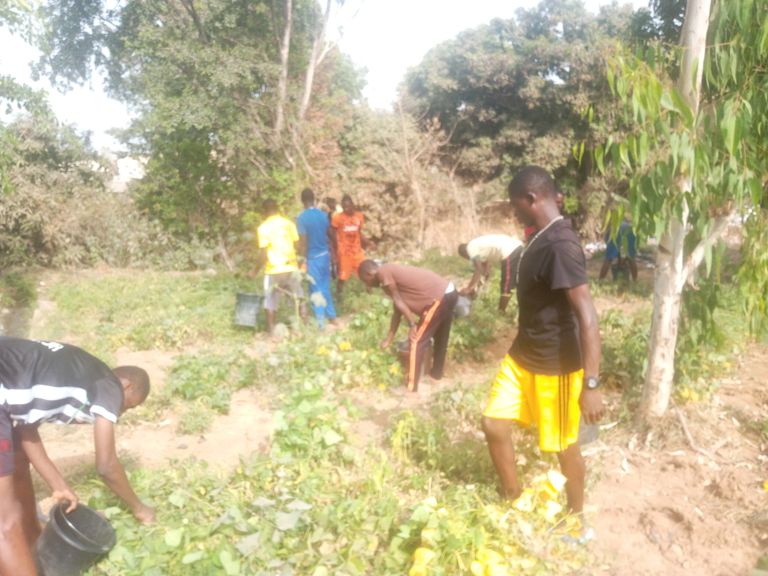Introduction
The modern period is a period often described as a time where the love for the human person is declined. So many people suffer and go through hardships. Life becomes unbearable for them. Everywhere in the world, people live in abject poverty and are been marginalized either by the government or by certain group of individuals who live an oppolent live style. It a period where many people find it hard to earn a source Living either in the form of shelter, food, clothing and other necessities of life. This group of persons are called the poor. This people continue to suffer simply because they have very few or none who will speak on their behalf. As such, it is our duty to treat this topic accordingly.
Who are the poor?
The 'Poor' as defined by Booth Charles are "those whose means may be sufficient, but are barely sufficient, for decent independent life; the ‘very poor’ those whose means are insufficient for this according to the usual standard of life in this country" (55).
Poor describes having little of something. If you lack needed food and shelter, you're poor, and if you fall below a standard or don't even try, you're giving a poor performance. Empty pockets and empty efforts both mean poor. Ratz and Grigs refer to poverty as a severe lack of physical and mental well-being, closely associated with in adequate economic resources and consumption (230). The Catholic Church teaches that the poor represent those who are marginalised in society. Jesus himself taught the importance of helping those who are poor and need help.
Kinds of Poverty
Modern moralists distinguish, according to the degree of need, three kinds of poverty:
(I) ordinary, such as that of the hired laborer, who lives from hand to mouth, has no property, but whose wages suffices to afford him a livelihood becoming his station.
(2) real want, or beggary, is the condition of those who do not possess and cannot earn sufficient means to support life, and depend on charity for what is lacking.
- extreme want, or destitution, is a state in which the means of support are lacking to such a degree that, without extraneous aid, existence is impossible.
4 Principles for Caring for the Poor
Warren Rick provides us with the key principles for caring for the poor. We must care about the poor because Jesus did. We do not have a choice but to act in like manner;
- Treat the Poor With Dignity: We’re not smarter, we’re not more talented, and we’re not more valuable than people who are poor. The Bible says, “Rich and poor have this in common: The Lord is the Maker of them all” (Prov. 22:2).
- Offer the Poor Opportunities: The Bible says, “When we have the opportunity to help anyone, we should do it” (Gal. 6:10). The best way to help the poor is to give them opportunities. Maybe people need training. Maybe they need help finding a job.
- Defend the Poor: It is our responsibility to care about injustice. We’re called to speak up when we see the poor (or anyone else) mistreated. The poor are vulnerable to abuse. They’re often the ones who get taken advantage of by unfair practices of businesses and landlords. And it’s the poor around the world who are most likely to get sold into slavery.
- Share What We Have: Following the injunctions of the scriptures, it teaches us thus, “Share your food with everyone who is hungry; share your home with the poor and homeless. Give clothes to those in need; don’t turn away your relatives” (Isa. 58:7). This captures in mind what mother Teresa of Calcutta once wrote that "if only one little unhappy child is made happy with the love of Jesus,...will it not be worth... giving all for that?" (54).
The care for the poor
Our Heavenly Father cares for the poor. There is an expression that grows out of that truth; it is that God helps those who cannot help themselves. Proverbs 19:17 affirms this; He that hath pity upon the poor lend unto the Lord; and that which he hath given will he pay him again” James said, “Pure religion and undefiled before God and the Father is this, To visit the fatherless and widows in their affliction, and to keep himself unspotted from the world” God cares for the poor and wants His children to do the same. Proverbs 31:8-9 reminds us to speak up for the poor; “Speak up for those who cannot speak for themselves; ensure justice for those being crushed. Yes, speak up for the poor and helpless, and see that they get justice.
The care of the poor is a branch of charity. Charity means any exercise of mercy towards one’s fellowman rooted in the love of God. While numerous classes of persons are fit objects for charity, the chief class is constituted by the poor. By the poor are meant persons who do not possess and cannot acquire the means of supporting life, and are thus dependent on the assistance of others. In accordance with Christ’s command (Matt. 25: 40), the care of the poor is the duty of all the members of the Christian body, so that by the works of each the welfare of the whole community may be promoted.
Liberation Theology is a movement within the Catholic Church. It began in Latin America in the 1950s and 1960s, in response to poverty in Brazilian society. It is based on the teaching of loving one's neighbour. Catholics working in this movement focus on helping those who live in poverty. They believe that poverty is the single most important issue faced by people in today's world as poverty leads to all sorts of disadvantages to do with health, education and participation in society
Preferential Option for the poor
The Church also teaches about the 'preferential option for the poor', that in order to improve life for the poor, we should speak for the voiceless and defend the defenceless. The Catholic Church was an open supporter, amongst many churches. The Church’s preferential option for the poor arose at the turn of the
1960s and 70s in Latin America as the result of internal and external validation of the faith, and personal, community, social and ecclesiastical life. 1 stated: “The preferential option for the poor to proclaim Christ as the Savior who illuminates their dignity, helps the min their efforts toward liberation from all deficiencies, and brings the min to communion with God and one another by living in evangelical poverty. (4).
John Paul II explains the option for the poor as follows: “Today more than ever, the Church is aware that her social message will gain credibility more immediately from the witness of actions than as a result to fits internal logic and consistency. This awareness is also a source of her preferential option for the poor, which is never exclusive or discriminatory towards other groups. This option is not limited to material poverty, since it is well known that there are many other forms of poverty, especially in modern society not only economic but cultural and spiritual poverty as well. The Church’s love for the poor, which is essential for her and apart of her constant tradition, impels her to give attention to a world in which poverty is threatening to assume massive proportions inspite of technological and economic progress.
In the countries of the West, different forms of poverty are being experienced by groups which live on the margins of society, by the elderly and the sick,by the victims of consumerism, and more recently by so many refugees and migrants. In the developing countries, tragic crises loom on the horizon unless in before it is too late.
In view of the above, the option for the poor is a proposal of subjective emancipatory and renewed activities in favor of people affected by the consequences of the lack of goods needed for development.
The object of ecclesiastical provision for the poor - The removal of their immediate need
- The nullification of the demoralizing effects of poverty,
- The fostering of a desire for work and independence.
- The exercise of an educative influence on the soul: “the care of souls is the soul of the care of the poor”. There is in addition the social object of promoting the public welfare and of procuring for the greatest possible number of persons a share in the goods of material and intellectual civilization.
The general duties of ecclesiastical relief of the poor - to prevent those able to earn their living from falling into poverty,
- to assist with alms the sick and the poor,
- To raise the religious and moral condition of the poor,
- To render social life a blessing for needy mankind.
The relief of the poor includes also today a number of important tasks arising from the injurious influences of capitalistic forms of production, the modern system of interest and usury in general, and the neglect of the moral foundations of social life based on Christianity. The Church seeks to fulfil the objects and duties of poor relief by means of the corporal and spiritual works of mercy usually included under the name of alms (Gilbert, JOHN W. GILBERT).
The Poor From the Catechism of the Catholic Church
The Church's pastors are not called to intervene in this restructuring of political and economic life. The lay faithful must act for social reform. They must "animate temporal realities" and be "witnesses of peace and justice" (2242). The Church's love for the poor is part of a constant Tradition. The duty of work flows from love for the poor because the worker can "give to those in need" both materially, culturally, and religiously.
Selfish Use of Riches (2445-2446)
Love for the poor is incompatible with the selfish use of riches. "Come now, you rich, weep and howl for the miseries that are coming upon you. Your gold and silver have rusted and their rust will be evidence against you and will eat your flesh like fire. The wages of the laborers which you kept back by fraud, cry out, and the cries of harvesters have reached the ears of the Lord of hosts" (Jas 5:1-6).
"Not to enable the poor to share in our goods is to steal from them. The goods we possess are not ours, but theirs" (St. John Chrysostom). "When we attend to the needs of those in want, we give them what is theirs, not ours" (St. Gregory the Great).
Almsgiving - Pleasing to God (2447)
There are spiritual works of mercy (instructing, comforting, forgiving, bearing wrongs patiently) and corporal works of mercy (taking care of the hungry, the homeless, the sick, the imprisoned, and burying the dead). Among these works, alms to the poor is most important and pleasing to God. "Give alms and everything will be clean for you" (Lk 11:41). James rebuked any Christian who saw a person in need "without giving them the things needed for the body" (Jas 2:16).
Human misery in its various forms (deprivation, oppression, illness, and death) show man's
inherited condition of frailty. This human misery always elicited the compassion of Christ and the Church has a preferential love for those in need. In spite of many failings, she must always work for the relief of those in need.
Measures to Help the Poor (2449)
Poor people can be found everywhere, despite the best efforts of high society. And, whether you like it or not, there may be times when you are confronted by a poor person and it engages you in conversation. In his encyclical Rerum Novarum, Pope Pius XIII emphasizes the fact that the church provides directly for the well-being of non owning workers by instituting and promoting activities which she knows to be suitable to relieve their distress (No. 43).
Various Ways to help the poor
In a bid to illustrate the love and care for the poor, Catherine Doherty writes that "I saw the Lord hungry and cold and shelterless. I could not rest. I had to take him into my arms to give him comfort. But lo, when I did, it was not God but just a child, hungry and cold..." (15). There are various ways we can help the poor in the society. Ahmed Ayaan makes it clear when he listed various ways we can render help to the poor and they include - Education
- Better understanding
- Donation of belongings
- Group involvement
- Collection drive
- Fund raising
- Social media
- Moral consolation
Conclusion



It is one thing to easily identify the poor in the society and it is another to render help to them Having seen the reality of poverty around the world, it is our duty as a Church to alleviate the increasing rise of poverty. And as we teach people to help the poor, we’re helping them to worship God. The scriptures makes it clear when it says “If you oppress poor people, you insult the God who made them; but kindness shown to the poor is an act of worship” (Prov. 14:31).
Chaiiii
See better food ooh